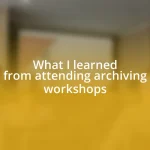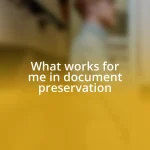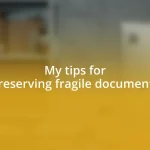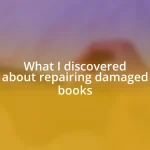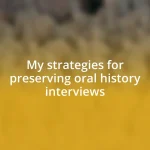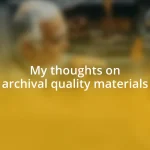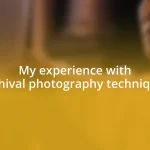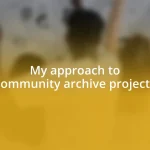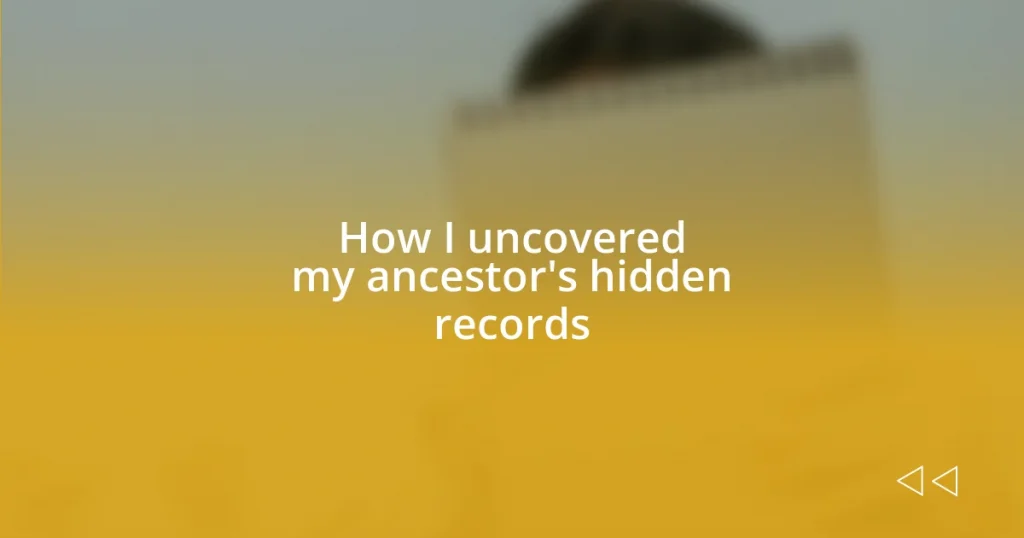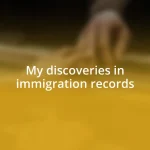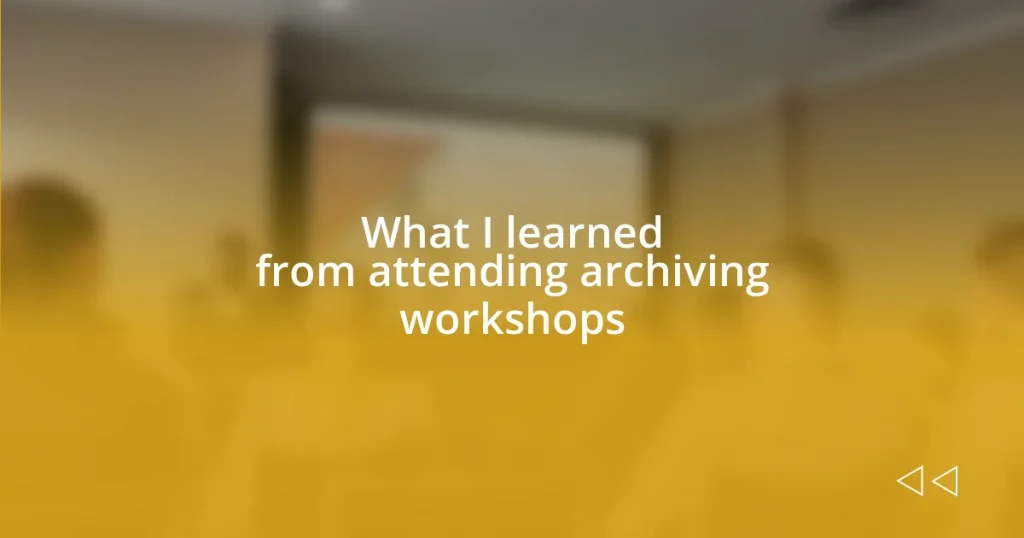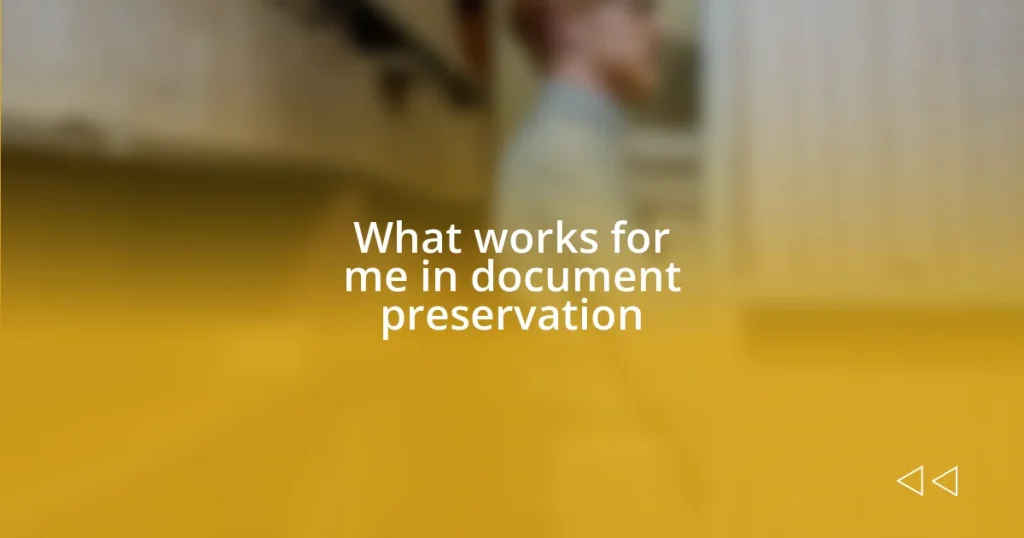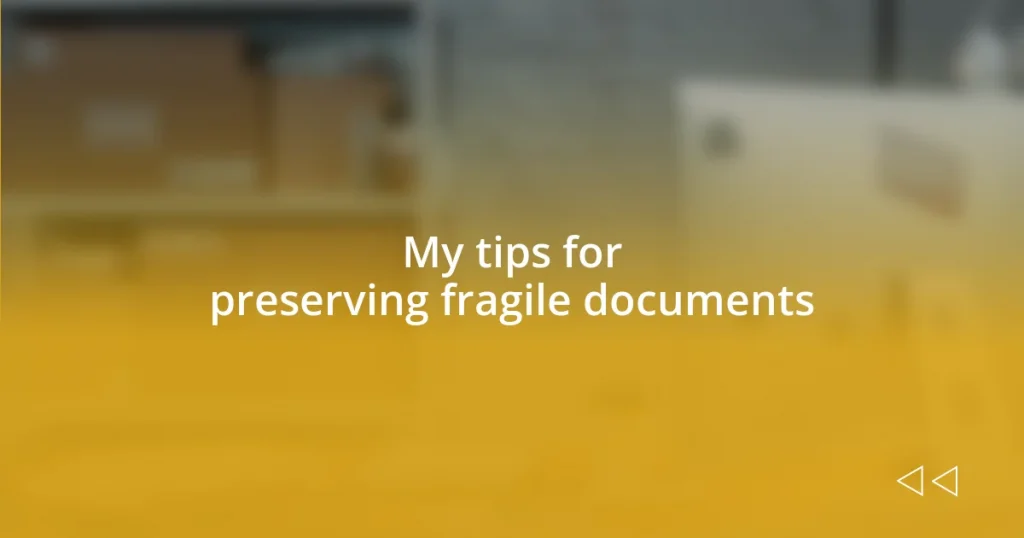Key takeaways:
- Hidden ancestor records, including letters and diaries, offer profound insights into the lives of previous generations, often revealing untold stories and emotional depth.
- Utilizing both online resources and local archives is essential for comprehensive family history research, as they can provide unique records and community support.
- Documenting and preserving discoveries through scrapbooks or digital backups ensures family histories are shared with future generations, emphasizing the importance of even the smallest details in genealogical research.
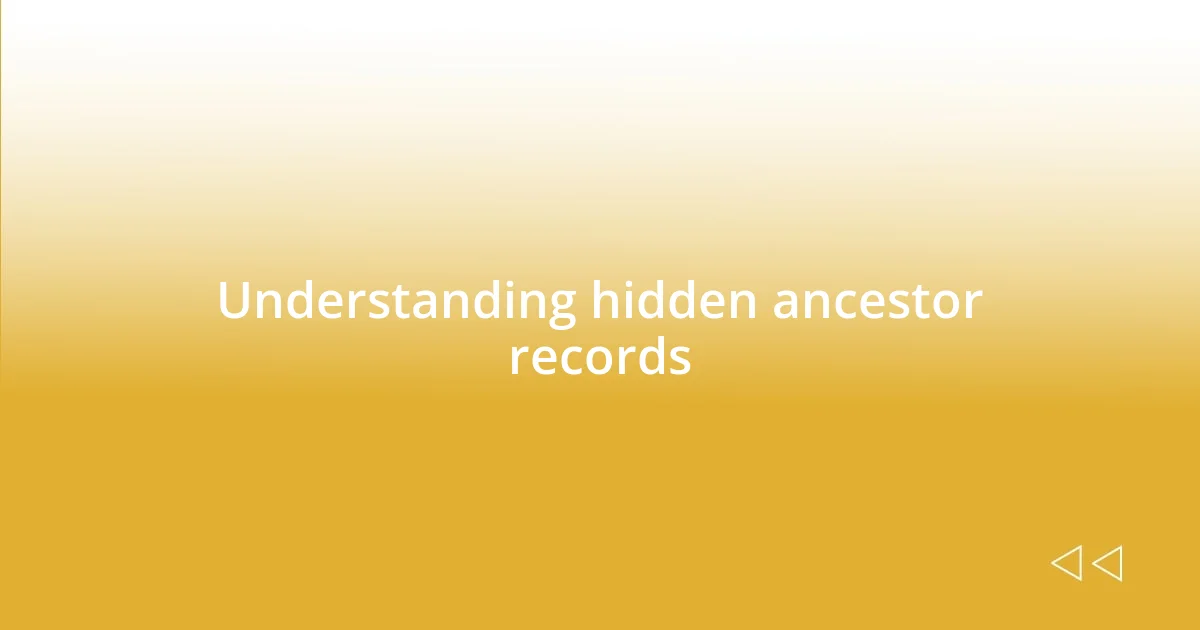
Understanding hidden ancestor records
Hidden ancestor records can feel like a treasure trove waiting to be discovered. I remember the excitement I felt when I stumbled upon an old, dusty box filled with my family’s documents in my grandmother’s attic. That moment ignited a passion within me — what secrets were hidden in those pages?
Many people underestimate the value of these records. They often think of birth certificates and marriage licenses as the only essential documents. However, I learned that letters, diaries, and even photographs can reveal so much about our ancestors’ lives. Have you ever considered what stories could be buried in the letters your great-grandparents wrote to each other?
Furthermore, understanding these hidden records requires a keen eye and a patient heart. I often found myself deciphering handwritten notes that seemed ambiguous at first, yet they contained profound emotional depth. For instance, an old letter revealed my great-uncle’s struggles during the war, giving me a glimpse into a world shaped by resilience and sacrifice. Isn’t it incredible how much we can learn about ourselves through the lives of those who came before us?
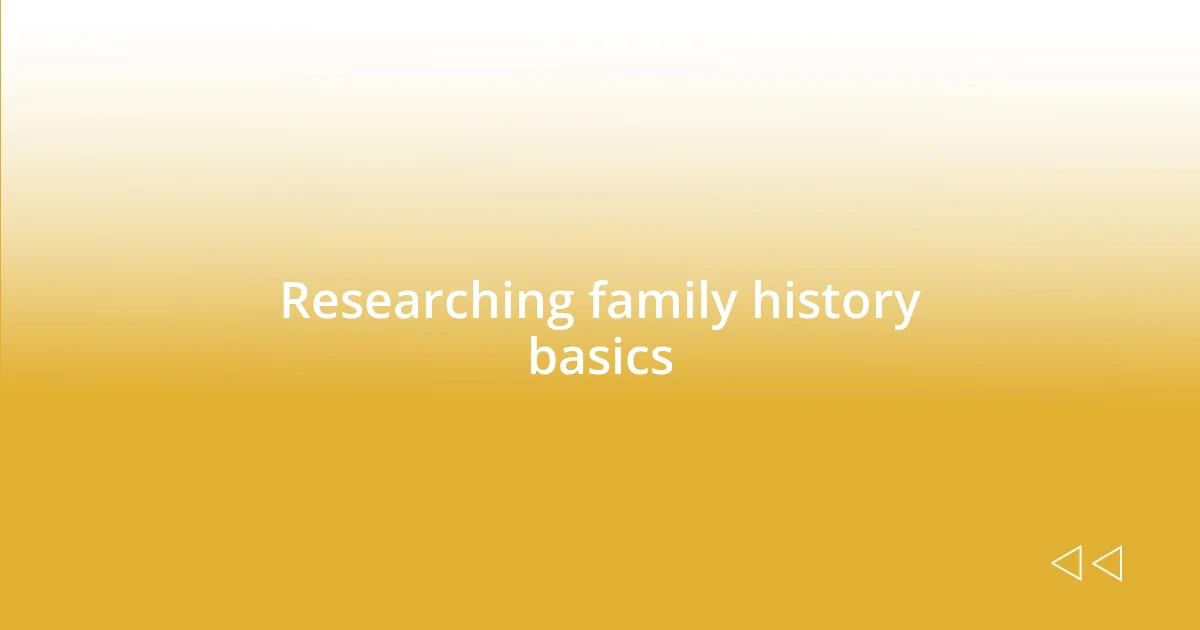
Researching family history basics
Researching your family history can feel like embarking on a thrilling treasure hunt. I recall my first visit to the local library, where I eagerly sifted through microfilmed newspapers from decades past. It was captivating to see my ancestors’ names in headlines, revealing their contributions to the community and their everyday lives.
Here are some essential steps to get started with your family history research:
- Start with what you know: Begin with your immediate family and work backward. Gather birth and marriage certificates, photos, and stories from relatives.
- Utilize online tools: Websites like Ancestry.com and FamilySearch.org offer vast resources, including census records, immigration lists, and military records.
- Visit local archives: Libraries, county offices, and historical societies often hold unique records not available online. I found exciting letters in my town’s historical society that painted a vivid picture of my great-grandmother’s experiences.
- Document everything: Keep organized notes and copies of your findings. I learned the hard way that forgetting details can lead to missed connections and lost stories.
Be prepared to face some challenges. There will be moments of frustration when leads go cold or documents are hard to decipher. I remember poring over a faded marriage certificate, the ink barely legible, but eventually piecing together a long-forgotten family drama that brought tears to my eyes. It’s these small victories that make the effort worthwhile.
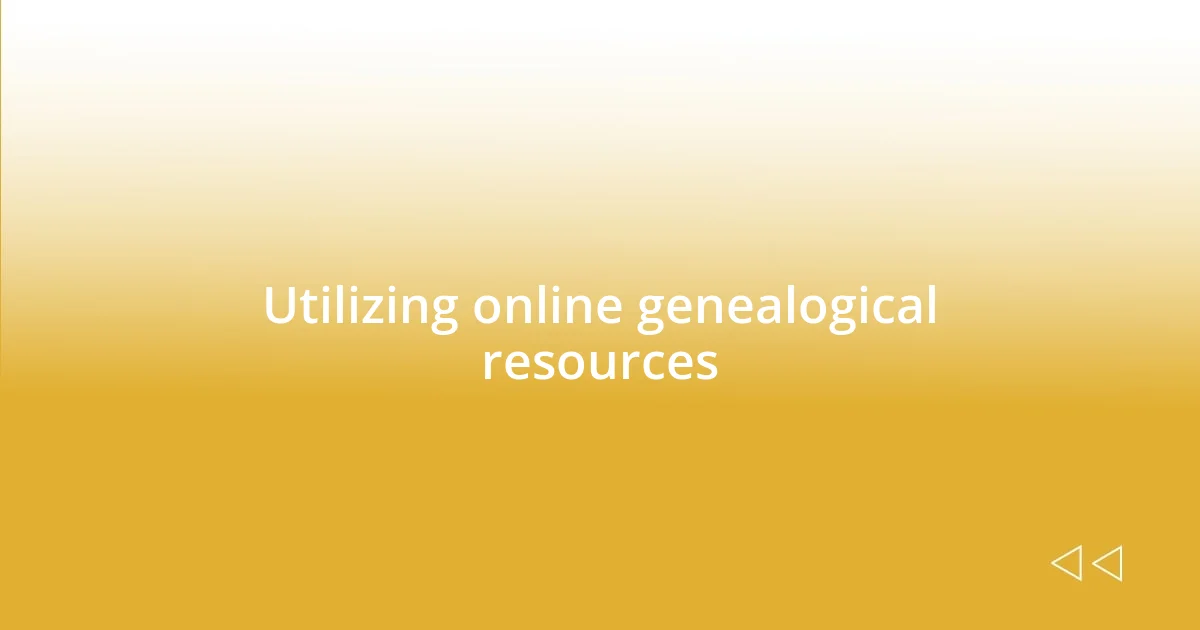
Utilizing online genealogical resources
Utilizing online genealogical resources can significantly enhance your search for hidden ancestor records. I fondly remember the first time I used Ancestry.com; it felt like stepping into a vast library filled with secrets waiting for me to uncover. The thrill of typing in my family’s names and instantly receiving a list of potential records was exhilarating. But it was the unexpected discoveries that truly made my heart race — like the census records that revealed my great-great-grandfather had a twin brother, a detail none of my family had ever mentioned before. Have you ever had a moment where a name suddenly linked you to a whole branch of your family tree?
Another vital aspect of utilizing these resources is the community of fellow enthusiasts. I joined online forums dedicated to genealogy, and the connections I made were invaluable. People shared tips, insights, and sometimes even links to records I hadn’t found yet. I recall one particular conversation where someone pointed me toward a digitized newspaper archive, leading me to a long-forgotten article about my grandmother winning a local baking competition. That moment reminded me that genealogy isn’t just about dates and names; it’s about honoring the lives and legacies of those who came before us.
Lastly, it’s essential to approach online resources with a discerning eye. Not all information found online is accurate, and I learned this the hard way when I confidently included a relative in my family tree based on a shaky online source. It turned out to be incorrect, and I had to revise my findings. This experience taught me the importance of cross-referencing records and verifying details. Remember, every little piece of the puzzle matters in building an accurate family history.
| Resource | Features |
|---|---|
| Ancestry.com | Extensive database of census records, military records, and family trees; user-friendly interface |
| FamilySearch.org | Free access to billions of records, community support, and various genealogy services |
| MyHeritage | Unique DNA testing options, extensive photo tools, and international records |
| Findmypast | Focus on UK records, valuable newspaper collections, and family tree features |
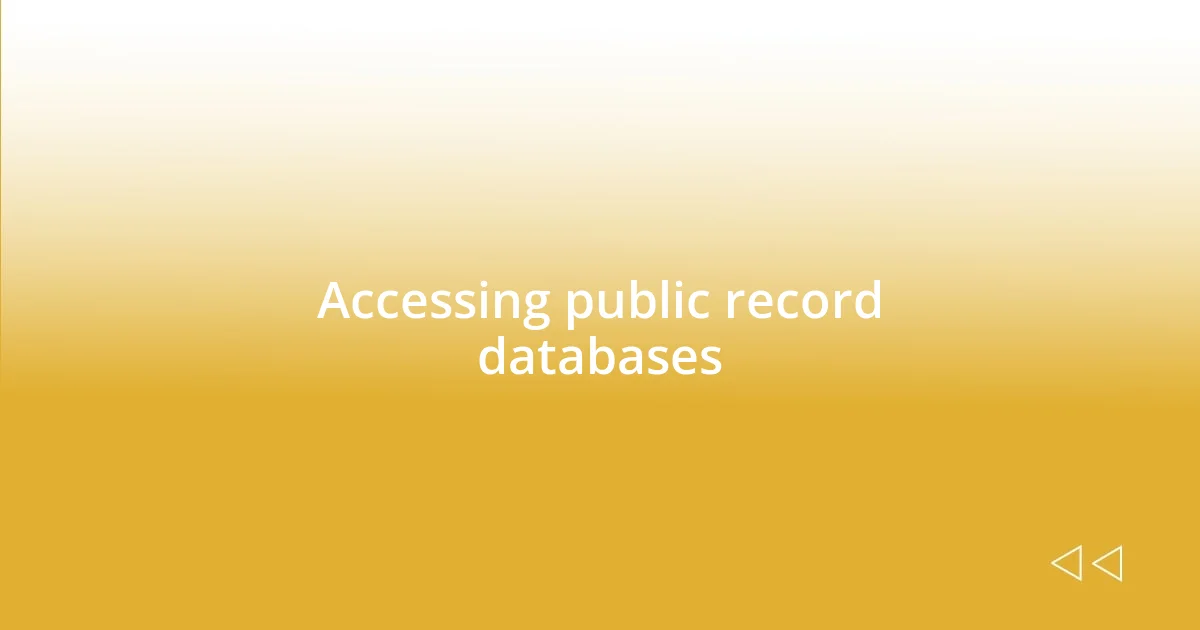
Accessing public record databases
Accessing public record databases is an adventure in itself. I remember the butterflies in my stomach when I first logged into my state’s public records website. Scrolling through official documents—deeds, births, marriages—felt like holding a key to my ancestors’ stories. Have you ever felt that rush of excitement when you stumble upon a record that changes everything you thought you knew?
While some records are available through government sites, navigating these databases can be daunting at first. I once spent hours trying to locate my great-grandfather’s land grant, only to find out it was tucked away under an obscure filing category. The experience taught me that patience and perseverance are key. Each search can unlock a new clue, so it’s essential to explore every possible angle and keyword.
It’s also worth noting that many local archives have digitized their records, making them accessible from home. I cherish the moments I spent poring over handwritten letters that had been scanned into digital form. Each faded signature felt like a whisper from the past, urging me to keep searching. These hidden records can illuminate your family’s history in ways you might not expect, revealing connections that have long been forgotten. Are you ready to dive deep into your family’s narrative?
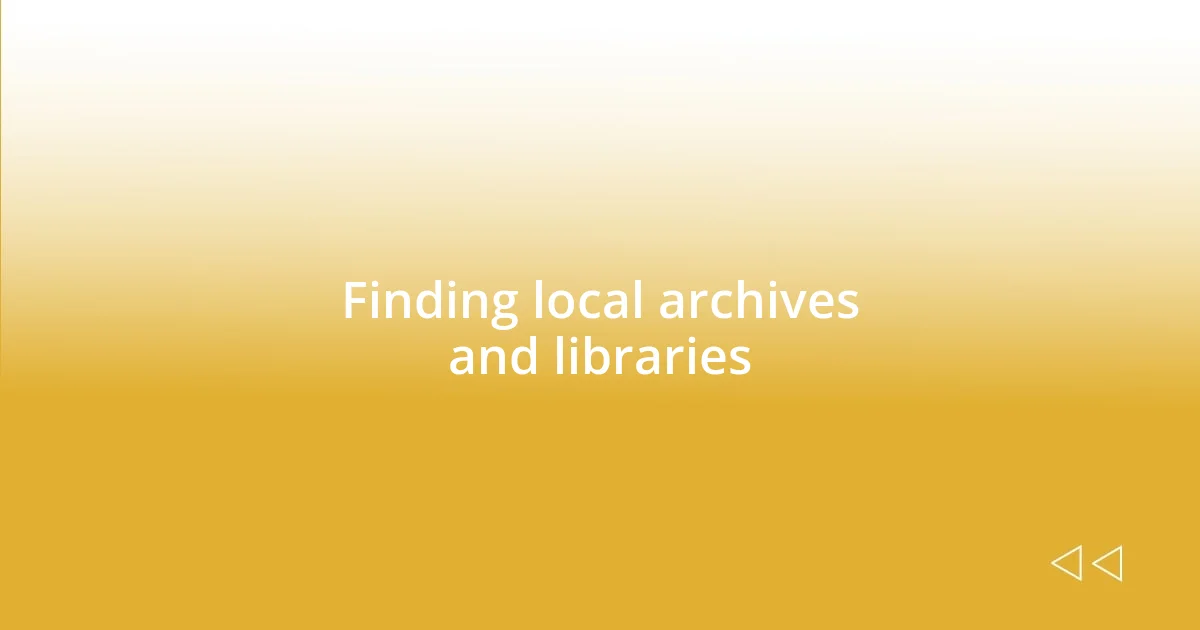
Finding local archives and libraries
Finding local archives and libraries can be a game-changer in your genealogical journey. I can still picture the moment I first entered my town’s historical society. The atmosphere was a mix of old books and the faint scent of aged paper, and I could feel the whispers of history surrounding me. Have you ever felt that rush of energy in a place where time seems to stand still? Here, I found not only documents but also friendly volunteers eager to help.
While sifting through stacks of records, I discovered a treasure trove of information that wasn’t available online. I came across a dusty ledger containing my family’s names, each entry telling a story of their lives and struggles. This firsthand experience opened my eyes to the unique finds that local archives can offer — things like land deeds and handwritten letters can provide context and color to the names on your family tree. Have you considered the hidden gems that might be waiting just around the corner?
Additionally, connecting with librarians or archivists can be incredibly rewarding. When I first broached my researching interests with a librarian, I was surprised at how eager she was to assist me. She introduced me to local newspapers from the 1800s that revealed fascinating details about my ancestors’ daily lives. Engaging with these professionals not only helped me uncover rich narratives but also fostered a genuine appreciation for the history rooted in my community. So, have you thought about visiting your local library or archive yet? You might just find what you’ve been searching for!
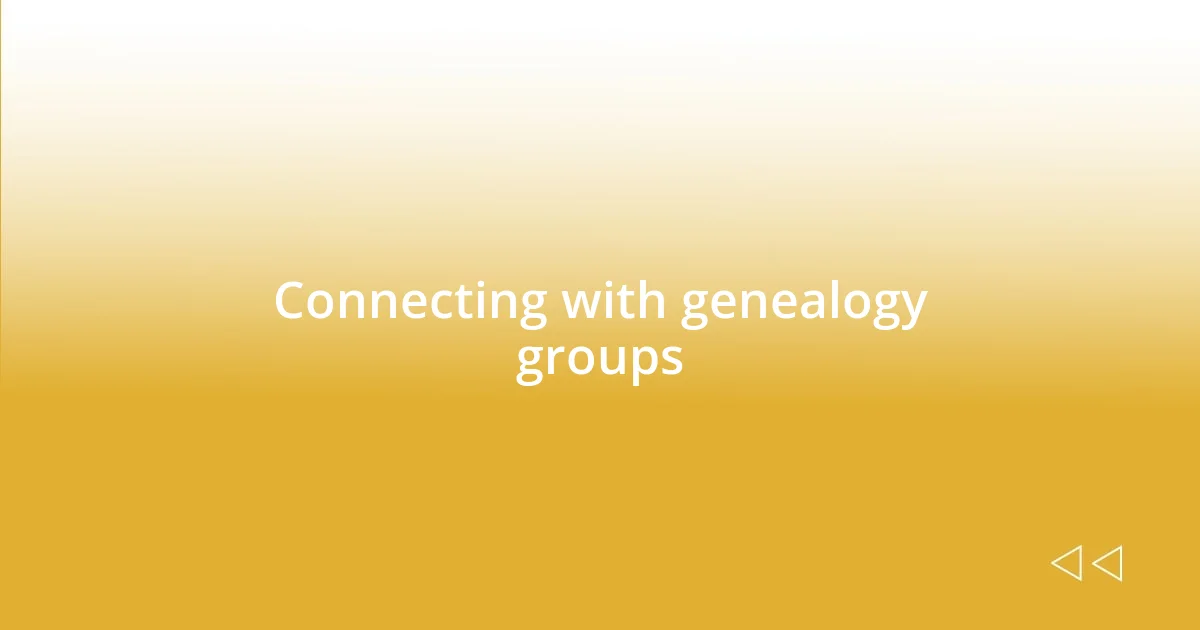
Connecting with genealogy groups
Connecting with genealogy groups can truly enhance your research experience. I remember my first meeting with a local genealogy club; there was a palpable sense of excitement in the room as fellow enthusiasts shared their discoveries. Have you ever walked into a space where everyone feels as passionate about family history as you do? It’s invigorating! Hearing others’ stories sparked new ideas in my own research, such as targeting specific historical contexts that I hadn’t considered before.
As I participated in group discussions, I learned not only about resources but also about valuable tools that transformed my approach. For instance, one member introduced me to DNA testing for genealogy, which I initially approached with skepticism. However, after seeing how it helped others break through brick walls, I decided to give it a try. It’s amazing how the collective knowledge and experience of a group can pave the way for breakthroughs in your personal journey.
Moreover, attending genealogy conferences opened my eyes to the broader community. My heart raced at the thought of meeting experts whose books I had devoured. I found myself engaging with speakers and asking questions that had long plagued my research. Have you considered how such connections could amplify your success in tracing your lineage? These interactions not only enriched my understanding but also nurtured friendships that turned into collaborative research efforts. It taught me that genealogy isn’t just about records—it’s about building relationships with others who share your passion.
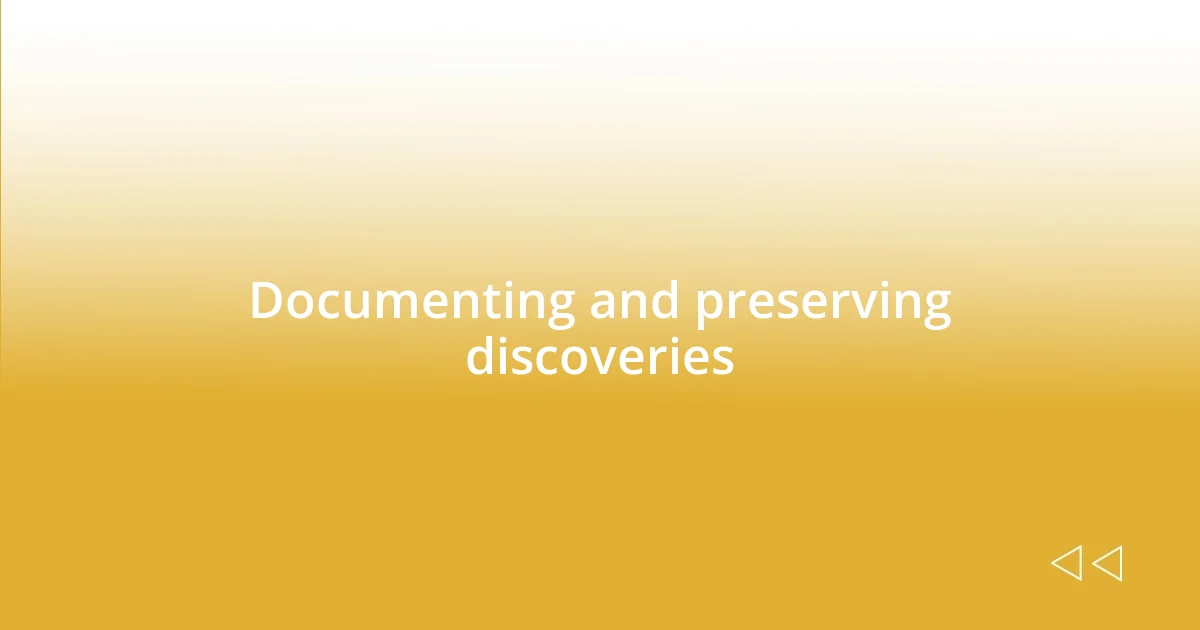
Documenting and preserving discoveries
Documenting discoveries is a crucial step in genealogy that I’ve learned to cherish. I vividly recall the day I decided to compile all my findings into a scrapbook. Each page revealed not just names and dates, but personal stories filled with photos, letters, and ancestral anecdotes. Have you ever experienced the joy of seeing your family history come to life on paper? It felt like I was knitting together strands of a tapestry that told my ancestors’ stories in a vibrant, tangible way.
Preserving this information isn’t just about keeping it safe; it’s also about sharing it with future generations. I created digital backups of my discoveries to ensure they wouldn’t fade with time. The thought of my children and grandchildren holding these records one day fills me with a sense of purpose. I want them to know where they came from and to feel that connection to their history. Have you considered how you might share your family’s narrative? Recording audio stories or creating a family website can be rewarding ways to engage others in your journey.
As I pieced together my ancestors’ lives, I focused on notating everything meticulously. Whether it was a scrap of paper with a family member’s handwritten notes or a photograph with fading details, every little find held significance and deserved attention. Reflecting on this process, I realized that even the smallest details, like a birth date or a beloved family recipe, contribute richly to our shared heritage. Are you taking the time to savor those details in your discoveries? I’ve found that the essence of genealogical research lies not just in the big revelations but in the quiet moments that chronicle our legacy.
